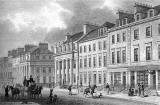|
|
Edinburgh Transport
Coaches and Inns
in the Eighteenth Century |
|
In the 1700s no local network of coach
services in and around Edinburgh had yet been established, but it was
becoming easier to travel to distant places.
The coaching business
that developed from Edinburgh in the
eighteenth century was linked to a
number of inns, and was due to the efforts of a few innkeepers.
|
John Somervell
There are variations
in the spelling of his name. |
|
In 1725,
an advert was
placed advising people interested in travelling to London or any part of
England to enquire to Mr Somervil's Gunsmith, Foot of Canongate.
This is the first advert that I have found for coaches from Edinburgh.
In 1736 John Somervell
advertised
'A good coach and six stout
horses to set out to London or Bath'. |
|
John Somervell
continued to advertise
in the mid-eighteenth century. At this time he described himself as
stabler, rather than Gunsmith. It took his Edinburgh Stagecoach
ten days in summer and twelve days in winter to make the journey of about 400 miles from Edinburgh to
London in 1754.
The coaching business in
Edinburgh developed during the eighteenth century, due to the efforts of a
few innkeepers. |
|
Inns |
|
White Lion Inn |
Mr Paxton's coaches
left the White Lion Inn, foot of Canongate, to travel to
London,
once a month in 1850 |
|
White Horse Inn |
John Dumbreck developed a
coaching business from White Horse Inn, Boyd's Close, off St Mary's Wynd, just outside the
Netherbow Gate, in the
1780s.
From here he ran:
- the "Edinburgh
and London Fly"
- the "Edinburgh
and Aberdeen Fly"
- coaches to Kelso
and Leith.
He then sold the business
to Duncan McFarlane in 1790. McFarlane added
- the "Stirling
Coach"
- the "Jedburgh
Ply"
- the "Berwick
Diligence". |
|
Black Bull Inn |
In 1772, the "Newcastle
Fly" ran from the Black
Bull Inn, at the head of the Canongate. |
|
White Hart Inn |
In 1772, a a coach to
Newcastle
also ran from the White
Hart Inn, near the Cowgate Port. This was shortly after the
inn had been acquired by James Dun.
The coach fare was 31s 6d to Newcastle and £4 14s 6d to
London.
The next tenant of the White Hart Inn (1777-1782) was Duncan
McFarlane. From this address, he ran:
- the "London
Fly"
- the "Glasgow
Diligence". |
|
Adam Square |
From
his house in Adam Square in 1790, Duncan McFarlane later ran:
- the "London
Fly"
- the "Jedburgh
Diligence" |
[Extract from 'Book of he
Old Edinburgh Club' Vol. XIV (1925) 'Some Inns of the Eighteenth
Century' supplemented by additional info found in old newspaper
advertisements.] |
|
Hotels and Coaches
John Dumbreck |
|
In 1779, John Dumbreck, a vintner
and innkeeper, purchased White Horse Inn, Boyd's Close, from John Boyd.
From there, Dumbreck ran the "Edinburgh and London Fly" and other coaches.
Here is an advertisement for the coach from March 1781
|
"In Four Days to London
during the Summer"
The Edinburgh and London
Fly will, on Monday 2nd April set out from the White Horse at 2 o'
clock in the morning precisely and continue to do so every lawful
day. |
John Dumbreck died in 1791,
leaving his eldest son William, born 1763, to run three Dumbreck Hotels in
St Andrew Square.
Originally the hotel was a
single building (possibly 37 or 39 St Andrew Square) but it subsequently spread into adjacent buildings
and became known as "Dumbreck's Hotels". William Dumbreck sold these
hotels to the newly formed National Commercial Bank in 1825. The pictures below were probably
engraved:
- LEFT: around
1800
- RIGHT: shortly after the sale of these hotels.
 ©
©
[Acknowledgement: Rod Dumbreck, descendant of William Dumbreck's family.] |
|
The New Town of Edinburgh
Royal Mail Coaches
Edinburgh - Glasgow |
|
Royal Mail coaches to from
Edinburgh to Glasgow started from the several locations in the New Town of
Edinburgh.
|
1794-1803 |
Tuft Coffee House, 1 St
Andrew Street, Edinburgh
Mr Drysdale,
proprietor, Later Forsyth's Dept Store was based here |
|
1804-1808 and possibly later |
Tuft Coffee House, 20 St
Andrew Street, Edinburgh
Mr Drysdale,
proprietor At the junction of South St Andrew Street and St
Andrew Square. |
|
When? |
Black Bull Inn, 1
Catherine Street, Edinburgh
part of Leith
Street |
|
When? |
MacGregor's Crown Hotel,
2 Princes Street, Edinburgh
Later the North
British Hotel, re-named Balmoral Hotel was based here |
[Acknowledgement for the
above details: Bill Cochrane] |
|
